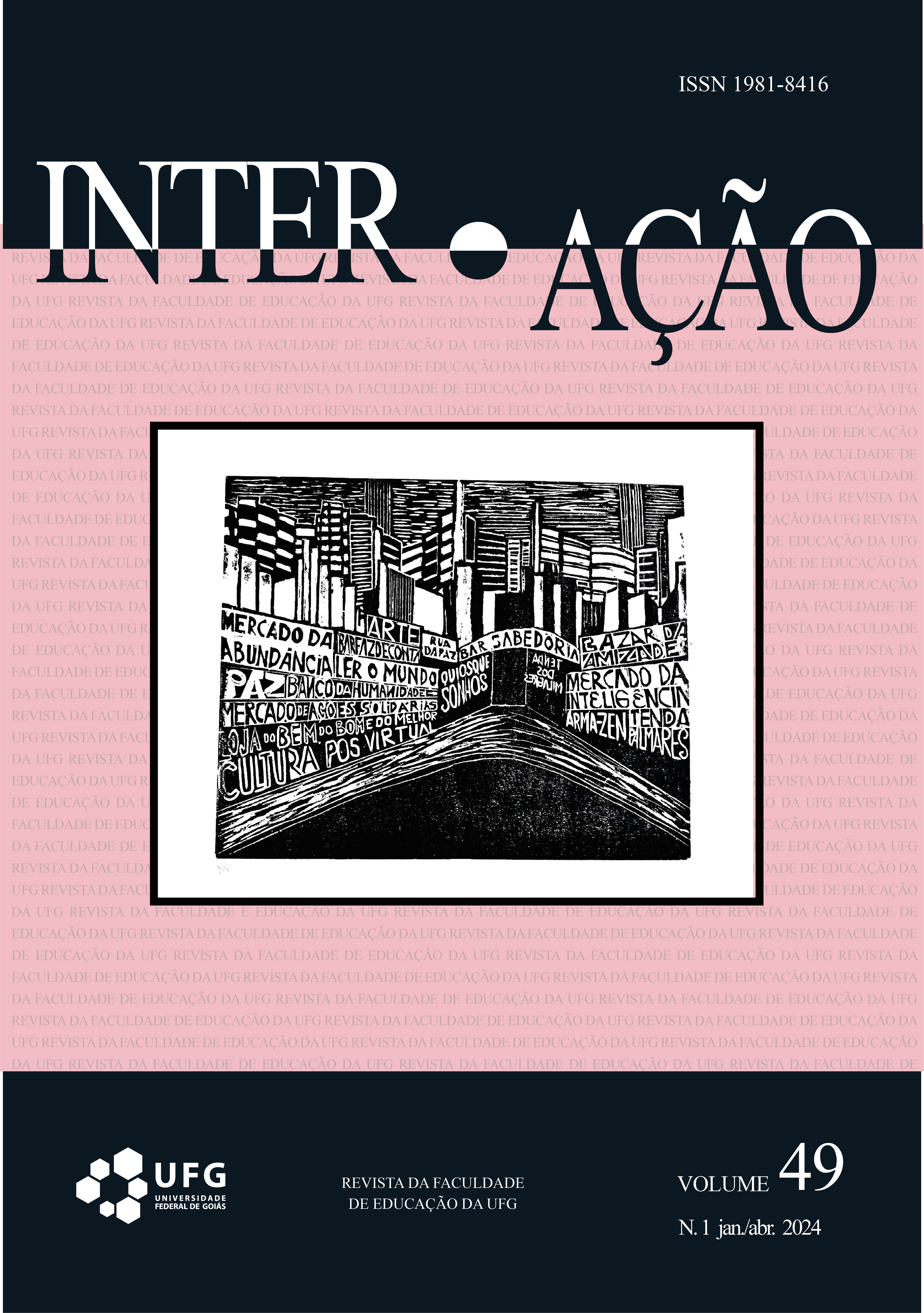PIXTON EN EL AULA: UNA EXPERIENCIA DE FORMACIÓN PARA PROFESORES DE LENGUA PORTUGUESA
DOI:
https://doi.org/10.5216/ia.v49i1.76688Palabras clave:
Pixton; Enseñando y Aprendiendo; Lengua Portuguesa; Formación de Profesores.Resumen
En este texto presentamos una experiencia de formación promovida a profesores de lengua portuguesa en educación básica. El objetivo fue explorar el potencial del recurso Pixton en la producción de cómics, considerando los elementos de una narrativa. Para ello, adoptamos un enfoque de investigación cualitativa, bajo los principios de la investigación acción. Las acciones formativas se basaron en la perspectiva del aprendizaje colaborativo, propuesta por Freire (1983; 1996). A partir de esta experiencia empírica y, en diálogo con Soares (2002), Moran (2000) y Santos e Silva (2021), entendemos que Pixton tiene el potencial de (re)significar los procesos de mediación de la enseñanza de la lengua y el aprendizaje del portugués.
Descargas
Citas
BRASIL. Ministério da Educação. Base Nacional Comum Curricular. Define o conjunto orgânico e progressivo das aprendizagens essenciais na Educação Básica. Brasília, DF: Ministério da Educação, 2018. Disponível em: Base Nacional Comum Curricular - Educação é a Base (mec.gov.br). Acesso em: 13 dez. 2022.
CHIMAINSKI, D. Atividade Didática: o pixton como ferramenta para a produção textual. 2018. Trabalho de Conclusão de Curso (Especialização em Tecnologias Digitais da Educação) – Centro de Artes e Letras, Universidade Federal de Santa Maria, Santa Maria, RS, 2018. Disponível em: https://repositorio.ufsm.br/handle/1/15374?show=full. Acesso em: 12 mar. 2023.
FREIRE, P. Pedagogia da autonomia: saberes necessários à prática educativa. São Paulo: Paz e Terra, 1996.
FREIRE, P. Pedagogia do oprimido. 12. ed. Rio de Janeiro: Paz e Terra, 1983.
MORAN, J. Novas tecnologias e mediação pedagógica. São Paulo: Papirus, 2013.
PAIVA, V. L. M. O. Manual de pesquisa em estudos linguísticos. 1. ed. São Paulo: Parábola, 2019. 160p.
REIS, S. C.; GOMES, A. F. Podcasts para o ensino de Língua Inglesa: análise e prática de Letramento Digital. Calidoscópio, São Leopoldo, v. 12, n. 3, p. 367-379, 2014. Disponível em: https://revistas.unisinos.br/index.php/calidoscopio/article/view/cld.2014.123.11. Acesso em: 10 mai. 2023.
SANTOS I. S.; SILVA, A. P. P. Letramento digital: a premência e as perspectivas no contexto da educação superior. Revista Philologus, Rio de Janeiro, ano 27, n. 79, p. 94-112, 2021. Disponível em: https://www.revistaphilologus.org.br/index.php/rph/article/view/15. Acesso em: 26 jun. 2023.
SOARES, M. Novas práticas de leitura e escrita e escrita: letramento na cibercultura. Educação e Sociedade: Revista de Ciência e Educação, Campinas, v. 23, n. 81, p. 143-160, 2002. Disponível em: http://www.scielo.br/pdf/es/v23 n81/13935.pdf. Acesso em: 21 jul. 2021.
SOARES, S. J. et al. Tecnologia digital de informação e comunicação (TDICs). In: Glossário Escola Politécnica de Saúde Joaquim Venâncio/ Fiocruz. Manguinhos, Rio de Janeiro, 2015. Disponível em: Tecnologia Digital de Informação e Comunicação (TDIC) | Glossário TDICs Tecnologias Digitais de Informação e Comunicação (fiocruz.br). Acesso em: 01 jul. 2023.
Publicado
Cómo citar
Número
Sección
Licencia
Derechos de autor 2024 Albina Pereira de Pinho; Eleandra Negri Costa; José Isavam Oliveira Silva

Esta obra está bajo una licencia internacional Creative Commons Atribución-NoComercial 4.0.
A Inter-Ação utiliza como base para transferência de direitos a licença Creative Commons Attribution 4.0 para periódicos de acesso aberto (Open Archives Iniciative - OAI). Por acesso aberto entende-se a disponibilização gratuita na Internet, para que os usuários possam ler, baixar, copiar, distribuir, imprimir, pesquisar ou referenciar o texto integral dos documentos, processá-los para indexação, utilizá-los como dados de entrada de programas para softwares, ou usá-los para qualquer outro propósito legal, sem barreira financeira, legal ou técnica.
Autores que publicam neste periódico concordam com os seguintes termos:
1) Autores mantém os direitos autorais e concedem à revista o direito de primeira publicação, com o trabalho simultaneamente licenciado sob a Licença Creative Commons Attribution que permite o compartilhamento do trabalho com reconhecimento da autoria e publicação inicial nesta revista.
2) Autores têm autorização para assumir contratos adicionais separadamente, para distribuição não-exclusiva da versão do trabalho publicada nesta revista (ex.: publicar em repositório institucional ou como capítulo de livro), com reconhecimento de autoria e publicação inicial nesta revista.
3) Autores têm permissão e são estimulados a publicar e distribuir seu trabalho online (ex.: em repositórios institucionais ou na sua página pessoal) a qualquer ponto antes ou durante o processo editorial, já que isso pode gerar alterações produtivas, bem como aumentar o impacto e a citação do trabalho publicado.















